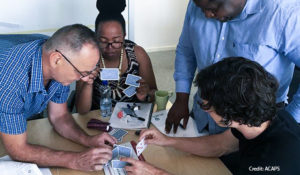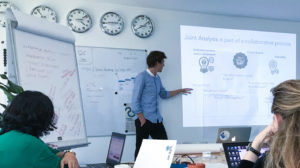Being able to turn data into useful evidence is critical for humanitarian actors working to support decision-makers in addressing internal displacement. In order to strengthen analysis capacity within the humanitarian sector, ACAPS recently launched the Humanitarian Analysis Programme (HAP), a training aimed at creating a network of highly skilled actors, able to analyse existing and new data sources more systematically, rigorously and jointly.
At JIPS, we prioritise capacity building for better and more useful data. Building on our complementary areas of expertise, we were involved in the development of the training integrating specific modules into the two-week intensive face-to-face sessions that opened the six-month training programme. With staff members joining the facilitation team and participant cohort, this collaboration demonstrates how ACAPS’s focus on secondary data review and analysis and JIPS’s expertise in the collaborative design and analysis of primary data meaningfully complement each other, thus creating the foundations for a more robust and consistent approach to data analysis in the sector overall.


Building analysis capacity ultimately means training people on how to establish clear processes for understanding what the data is actually telling us, both through explaining why certain patterns and trends emerge and clarifying the implications for what needs to happen next.
To this end, our colleague Melissa Weihmayer took part to the training, along with 23 other participants from organisations working on displacement, data production, and responses to humanitarian crises, including DRC, NRC, OCHA and IFRC.
A wide array of resources shared by ACAPS were used to challenge participants to “rethink” the analysis process (the analysis workflow, analysis spectrum, and canvas in particular) and reflect on how to improve the quality and reliability of analysis, by learning how to identify cognitive biases in humanitarian analysis, spot dubious data and recognise the sources of error in humanitarian assessments.
For a period of 6 months, participants will be involved in face-to-face trainings, webinars, discussion groups, and mentorship from experts. By the end of the training, they will mainstream the analytical approaches and techniques learnt during the training into analysis projects within their own organisations.


During the training, our colleagues Wilhelmina Welsch and Svend-Jonas Schelhorn, part of JIPS’s Information Management & Innovation Unit, introduced participants to collaborative analysis and stakeholder engagement, key areas of JIPS expertise.
Starting with an emphasis on stakeholder engagement as a process that enables joint analysis, participants learned how to identify the typical challenges, enablers and blockers of engagement, such as competing agendas among stakeholders, different priorities and approaches, and contextual differences. Participants grappled with the different types of engagement – from cooperation, coordination and collaboration- and the role that they each play within analytical workflows.
A second session focused on stakeholder mapping and techniques for understanding the interests of different actors, with discussions on how to keep them engaged and committed throughout the analysis process. Going more in depth, JIPS also shared useful information on how to plan and conduct joint analysis workshops, by applying neutral facilitation techniques and understanding how – and to what extent – to compromise to reach consensus on results.

Promoting stakeholder engagement and joint analysis remains one of JIPS’s main strategic priorities. On an inter-agency level, this means ensuring that humanitarian and development actors work better together to jointly make sense of data, thus giving them concrete strategic and operational meaning. Moreover, joint analysis is a way to encourage engagement between government institutions, such as National Statistical Offices, alongside humanitarian and development agencies, which can improve mutual understanding, contribute to locally-owned data processes, and increase data sharing in the long term.
To facilitate joint analysis of profiling data, JIPS invested in developing the Dynamic Analysis and Reporting Tool (DART), which enables groups to work together to explore survey datasets and build joint reports. Moreover, through our engagement to the Grand Bargain’s Needs Assessment work stream including the Joint Inter-sectoral Analysis Group (JIAG) led by OCHA, we hope to contribute to the developed of system wide tools and approaches to enhance joint analysis.
JIPS also continues to pilot joint analyses at the community level by discussing and validating findings with affected communities, in line with our six core principles for community engagement in profiling. Concretely, this is reflected in efforts to bring in communities’ voices in the Myanmar profiling exercise, our involvement in the Urban Analysis Network – Syria (UrbAN-S) project, the IASC Task Team on AAP (Accountability to Affected Populations), as an integral part of our work on Durable Solutions analyses.